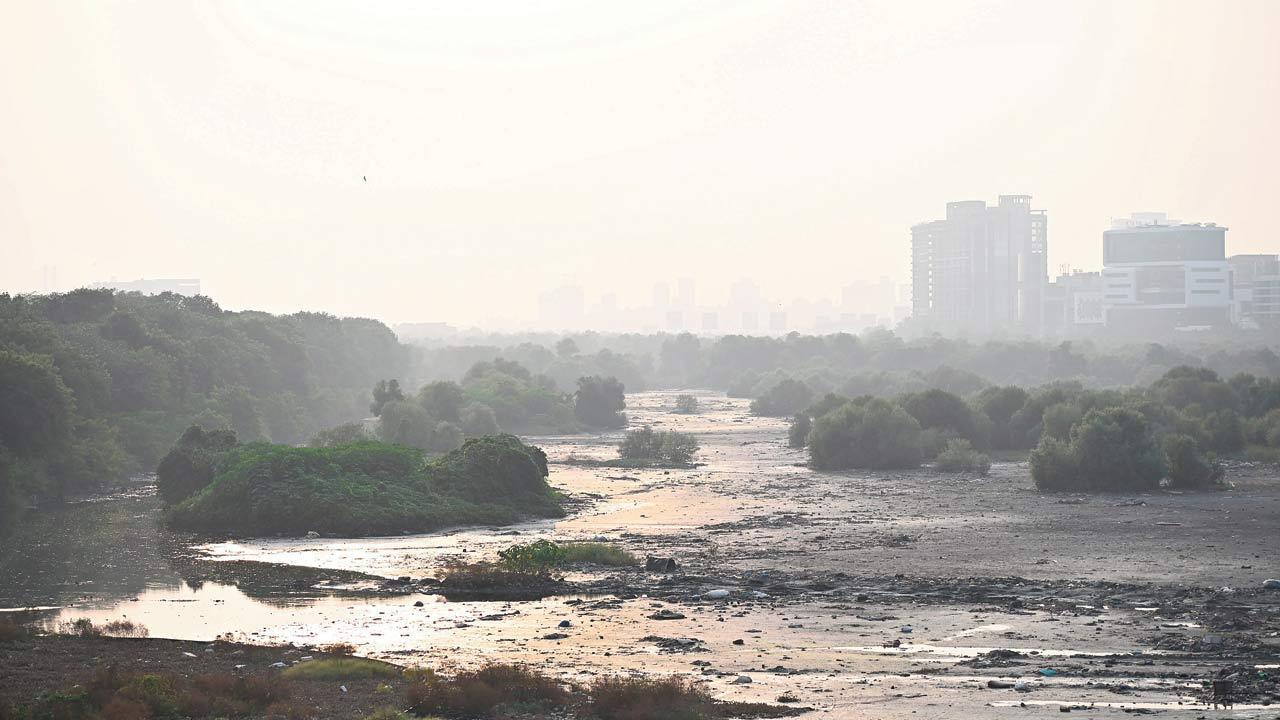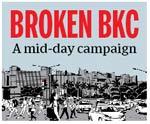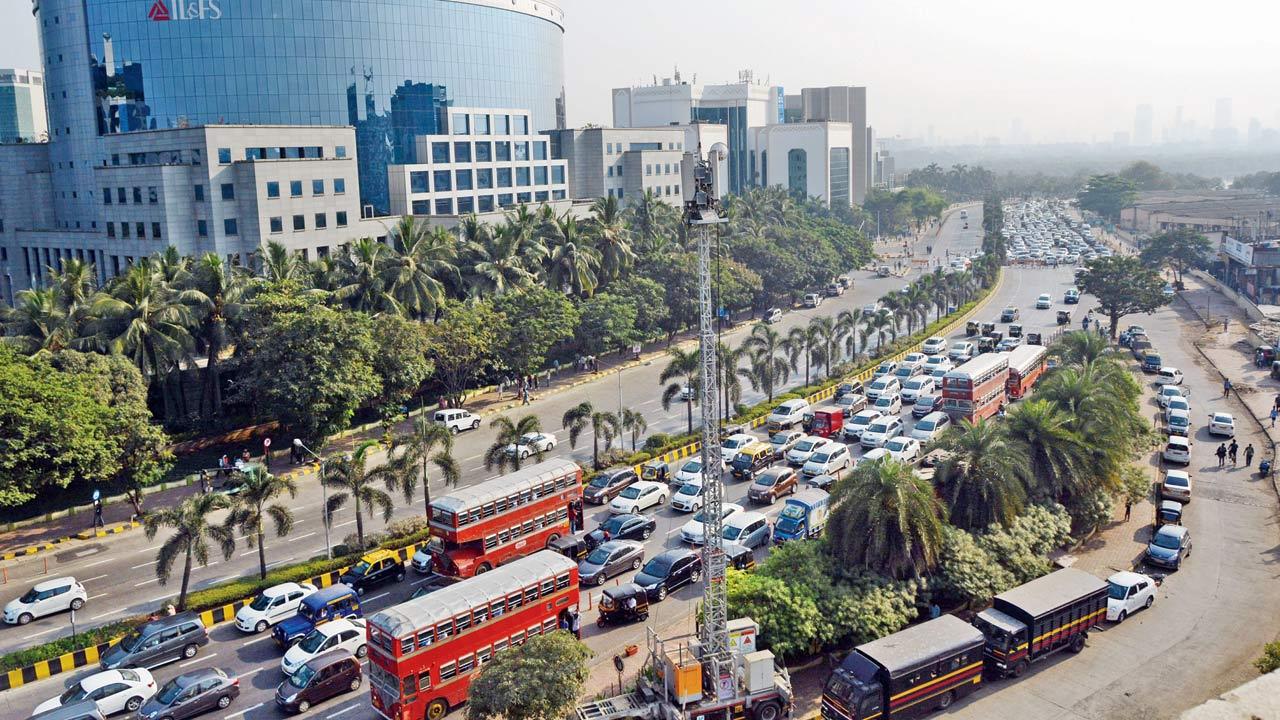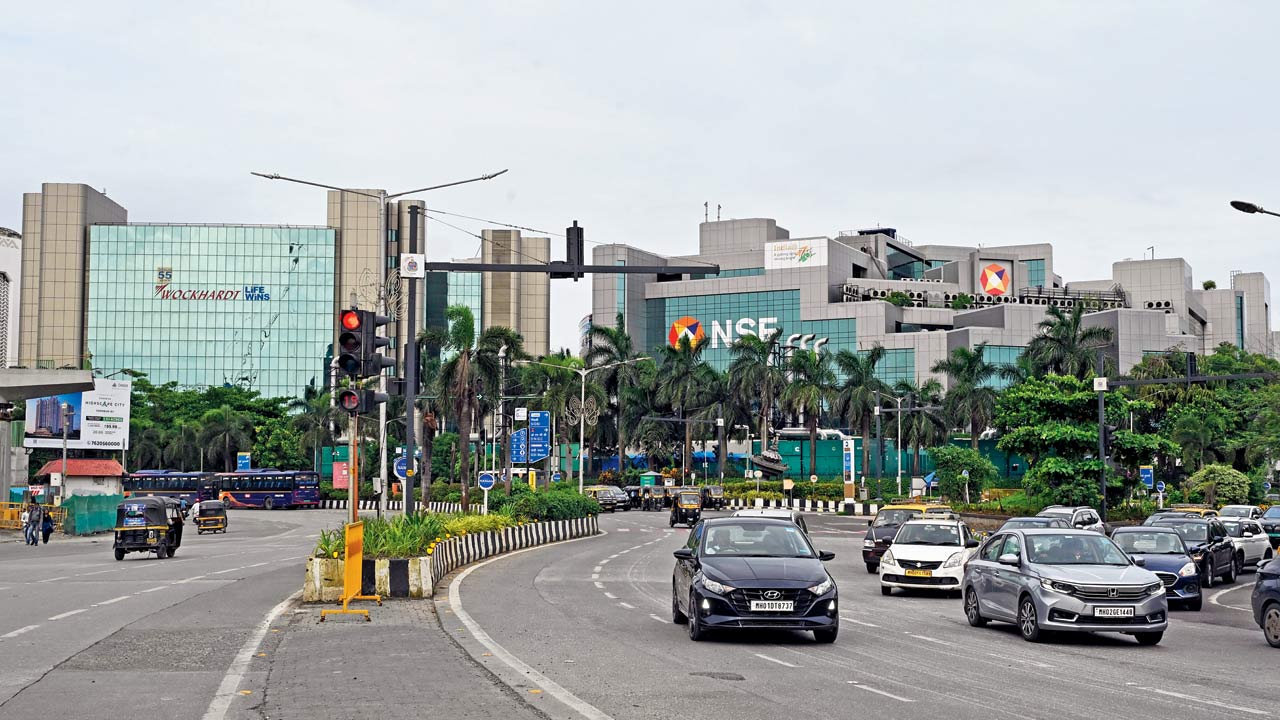Fed up with daily hassles, those living and working in Bandra-Kurla Complex demand immediate solutions to their woes

A view of BKC draped in haze on October 28. Pic/Kirti Surve Parade
 Originally planned as a commercial hub, BKC is today among Mumbai’s costliest real estate spaces. In March this year, industrialist Uday Kotak expressed awe over the area, noting that office buildings in Mumbai’s BKC command higher prices than those in Manhattan. He made this statement in response to a social media user who posted that a New York commercial office building had sold at Rs 16,000 per sq foot—less than half of BKC’s going rate.
Originally planned as a commercial hub, BKC is today among Mumbai’s costliest real estate spaces. In March this year, industrialist Uday Kotak expressed awe over the area, noting that office buildings in Mumbai’s BKC command higher prices than those in Manhattan. He made this statement in response to a social media user who posted that a New York commercial office building had sold at Rs 16,000 per sq foot—less than half of BKC’s going rate.
One of the highest lease rentals ever paid for office space in Bandra Kurla Complex (BKC)on a short-term basis was Rs 700 per sq ft for a commercial space in June 2024. The current per sq ft rate in BKC ranges from Rs 500 to Rs 650, according to a real estate agent.
ADVERTISEMENT

One not only inhales the city’s worst air quality but also sees severe traffic congestion at Bandra Kurla Complex. File Pic/Sayyed Sameer Abedi
Despite paying such high rents, working and living in BKC can be a nightmare. One not only inhales the city’s worst air quality after paying premium prices but also encounters severe traffic jams and connectivity issues due to fragmented infrastructure. Broken infrastructure remains a major problem for this high-profile district. In a three-part series, mid-day breaks down the key issues plaguing the area.
Enter BKC from Bandra stn
“The auto menace at the station is highly problematic. They don’t even allow commuters to get down from the foot overbridge and bully them. In Bandra West, things are a bit more organised, but it’s a different story outside the east exit,” said Akanksha Gawde, a government employee and commuter. “Why are there no buses outside Bandra station? There is space for autos and Chalo buses, but not for regular buses. Is BEST working for the benefit of the auto drivers here? The authorities must get their act together,” said Randivyesh Shukla, another commuter.
Entering BKC from the Kurla side via the connector:
Lionel Falcao, who visits BKC daily, said, “Commuting in BKC is a daily nightmare due to traffic gridlock and broken promises. Regular traffic snarls have wreaked havoc on countless citizens’ daily travel, compounded by the disarray at vital junctions, such as the clogged BKC area, where the promise of a ‘walk to work’ concept has sadly failed to materialise. Vehicles entering and exiting via the BKC connector and the National Stock Exchange (NSE) are left dealing with constant delays and disruptions.”

Despite high rents, working and living in Bandra Kurla Complex can be a nightmare. File Pic/Ashish Raje
Falcao explained that heavy traffic on LBS Marg frequently causes missed appointments and late arrivals. “This issue worsens at the BKC connector and BKC One Junction, which links Plot C-80 to Plot C-79, below the BKC connector, stretching from the SEBI building to Avenue 5 (BKC connector road) and Avenue 3 (WeWork). Disrupted cab services and last-minute cancellations leave commuters scrambling for alternatives and cause additional delays. The contract bus parking on main roads worsens the situation, showing an alarming disregard for the city’s needs. The streets of Mumbai belong to its people, and it’s high time their voices are heard.
Commuters deserve an effective solution to transform their daily nightmare into a smoother travel experience. The clock is ticking, and the city’s vitality hangs in the balance,” Falcao added.
High-profile users complain
The lack of proper connectivity, unruly autos, barricades, and ongoing digging and construction along the main road, which has left numerous streetlights non-functional, is not how the city’s costliest district should appear. Despite these issues being frequently highlighted by high-profile BKC users and even a sitting minister, no concrete solutions have been implemented.
Frustrated with daily traffic hassles, members of the Bharat Diamond Bourse (BDB) wrote a detailed letter earlier this year, outlining the commuting problems faced by their staff both within BKC and to the nearest stations. These challenges have begun affecting their operations, and they emphasised that a fundamental design flaw exists. “We write to formally express the severe hardships faced by the stakeholders of ‘G’ Block, BKC in general, and of BDB in particular, due to the acute traffic congestion within BKC area. As one of the largest and most frequented commercial establishments in BKC, with an average daily footfall of approximately 80,000 and a vehicular influx of nearly 9,000, we are compelled to highlight the critical infrastructural challenges that are adversely impacting our operations,” the letter stated.
“An aerial view of BDB and its immediate surroundings unequivocally reveals a fundamental design flaw in the allocation of space. The disproportionate width of the pedestrian walkway and green area, at 21 metres, in stark contrast to the mere 15-metre road designed for four lanes of traffic, is a glaring anomaly. This architectural oversight has exacerbated traffic congestion during peak hours, causing significant delays and disruptions for our stakeholders,” the letter, a copy of which is with mid-day, stated.
The flaws listed
1. Spatial planning discrepancies: An aerial view of BDB and its surroundings clearly reveals significant discrepancies in the design and approval process. The disproportionate allocation of space to the garden and footpath (21 metres) compared to the road (four lanes, 15 metres) exemplifies this oversight.
2. Urgent infrastructure upgrade: We strongly advocate for a comprehensive redesign of the BKC area, with active participation from key stakeholders. This redesign should prioritise expanding road width to accommodate increased traffic volume.
3. Traffic management enhancements: We propose keeping the left lanes open at all times, removing unnecessary barricades after Metro construction, and implementing a smart traffic signalling system to dynamically adjust traffic flow based on real-time conditions.
4. Dedicated traffic division: Given the unique challenges posed by the BKC area, we urge the establishment of a dedicated traffic division under the BKC police station. BDB is prepared to extend full cooperation in this endeavour.
5. Increased traffic manpower: The Mumbai Traffic Police Department should deploy additional manpower during peak hours at key intersections. BDB is ready to provide its own security traffic wardens to assist the traffic police. However, a consistent and visible Traffic police presence is essential for better impact.
6. Public transport infrastructure: Dedicated parking facilities for private buses and auto-rickshaws are essential for public convenience. However, the current road infrastructure requires a strategic approach to prevent further congestion.
Pedestrian bridges
A few key pedestrian bridges linking BKC with Kurla, Sion, and Chunabhatti could transform pedestrian access and make BKC more walkable, according to a proposal from the Walking Project to the Mumbai Metropolitan Region Development Authority (MMRDA) and the guardian minister. This is one of many suggestions collected from a survey conducted at BKC, which identified issues and recommended enhancements to improve pedestrian-friendliness in the area.
“If the MMRDA were to add pedestrian bridges over the Mithi River, similar to those in Ahmedabad, the walking distance between Kurla Station and Diamond Bourse could be reduced by nearly 25 per cent, from 2.1 km to 1.6 km,” said Vedant Mhatre, programme director of the Walking Project.
Two bridges in Kurla West could link the New Mill Road/SG Barve Road path, and another could connect from Belgrami Road. Adding a bridge and a few foot overbridges (FOBs) further south would make it possible for pedestrians to walk from Sion and Chunabhatti stations, reaching ONGC in just 15 minutes (1.3 km). “This would alleviate passenger load at Kurla Station and its surrounding area,” he added.
“People routinely walk these distances in Fort and Churchgate every day. It’s a practical solution, yet it’s puzzling why the BKC connector was not designed with footpaths, given that it passes directly by Chunabhatti station.”
Bandra skywalk
The old skywalk, with one arm extending to Kalanagar and another to Bandra court via Anant Kanekar Marg (station road), was built in 2008 by the MMRDA and subsequently handed over to the BMC. With repairs estimated to cost R7 crore, the BMC opted for reconstruction. The old bridge was demolished in October 2022, but there is no sign of the new skywalk. Construction on the new skywalk began after the monsoon season.
Minister’s solutions
Mumbai Suburban district’s Guardian Minister Mangal Prabhat Lodha wrote to the MMRDA in August 2024, requesting immediate measures to address traffic congestion at BKC. The traffic issues worsened after the Sion Road overbridge was closed.
“It has been repeatedly brought to the attention of the relevant authorities that traffic congestion in BKC is increasing and has become unbearable. Due to Metro construction, road space has further decreased. While a cycle track and garden were built, we must acknowledge that the cycle track is rarely used. As the guardian minister for the suburb, I have met with all officers concerned and stakeholders over the past six months,” Lodha stated.
He proposed a three-point plan involving more buses, merging cycle lanes, and removing unnecessary barricades:
1. Cycle track: The cycle track could be removed from the road, and the MMRDA could construct a separate track on an adjoining plot in BKC where cyclists could ride safely.
2. Reduced barricades: The barriers installed for Metro work should be minimised to allow more space for pedestrians and motorists.
3. Improved transportation: There are significant traffic issues and instances of overcharging by taxis and autorickshaws at Bandra Station (East) for rides to and from BKC. The MMRDA should consider implementing special bus services from Bandra Station to the BKC route.
 Subscribe today by clicking the link and stay updated with the latest news!" Click here!
Subscribe today by clicking the link and stay updated with the latest news!" Click here!







